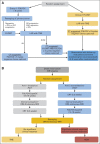Advances and challenges in treatment of locally advanced rectal cancer
- PMID: 25918296
- PMCID: PMC4559608
- DOI: 10.1200/JCO.2014.60.1054
Advances and challenges in treatment of locally advanced rectal cancer
Abstract
Dramatic improvements in the outcomes of patients with rectal cancer have occurred over the past 30 years. Advances in surgical pathology, refinements in surgical techniques and instrumentation, new imaging modalities, and the widespread use of neoadjuvant therapy have all contributed to these improvements. Several questions emerge as we learn of the benefits or lack thereof for components of the current multimodality treatment in subgroups of patients with nonmetastatic locally advanced rectal cancer (LARC). What is the optimal surgical technique for distal rectal cancers? Do all patients need postoperative chemotherapy? Do all patients need radiation? Do all patients need surgery, or is a nonoperative, organ-preserving approach warranted in selected patients? Answering these questions will lead to more precise treatment regimens, based on patient and tumor characteristics, that will improve outcomes while preserving quality of life. However, the idea of shifting the treatment paradigm (chemoradiotherapy, total mesorectal excision, and adjuvant therapy) currently applied to all patients with LARC to a more individually tailored approach is controversial. The paradigm shift toward organ preservation in highly selected patients whose tumors demonstrate clinical complete response to neoadjuvant treatment is also controversial. Herein, we highlight many of the advances and resultant controversies that are likely to dominate the research agenda for LARC in the modern era.
© 2015 by American Society of Clinical Oncology.
Conflict of interest statement
Authors' disclosures of potential conflicts of interest are found in the article online at
Figures




References
-
- Minsky BD. Chemoradiation for rectal cancer: Rationale, approaches, and controversies. Surg Oncol Clin N Am. 2010;19:803–818. - PubMed
-
- Heald RJ, Ryall RD. Recurrence and survival after total mesorectal excision for rectal cancer. Lancet. 1986;1:1479–1482. - PubMed
-
- Arbman G, Nilsson E, Hallböök O, et al. Local recurrence following total mesorectal excision for rectal cancer. Br J Surg. 1996;83:375–379. - PubMed
-
- Wibe A, Møller B, Norstein J, et al. A national strategic change in treatment policy for rectal cancer: Implementation of total mesorectal excision as routine treatment in Norway—A national audit. Dis Colon Rectum. 2002;45:857–866. - PubMed
-
- Kapiteijn E, Putter H, van de Velde CJ. Impact of the introduction and training of total mesorectal excision on recurrence and survival in rectal cancer in The Netherlands. Br J Surg. 2002;89:1142–1149. - PubMed
Publication types
MeSH terms
Grants and funding
LinkOut - more resources
Full Text Sources
Miscellaneous

